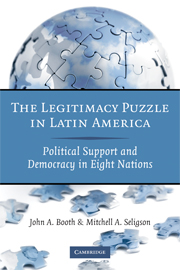Book contents
- Frontmatter
- Contents
- List of Figures
- List of Tables
- Preface
- 1 The Legitimacy Puzzles
- 2 The Structure of Legitimacy
- 3 Countries in the Study
- 4 The Sources of Political Legitimacy
- 5 Legitimacy and Political Participation
- 6 Legitimacy and Negative Political Capital
- 7 Legitimacy and Democratic Values
- 8 The Sky Is Not Falling: The Puzzle Solved
- Appendix A Supporting Data and Analyses for Chapters 1–5
- Appendix B Variables Used in the Analyses
- Appendix C System-level Performance Measures
- Appendix D Nonsampling Errors, Sampling Errors, and Design Effects for the Eight-Nation Survey
- Appendix E Method of Constructing the Legitimacy Factor Scores
- References
- About the Authors
- Index
Appendix E - Method of Constructing the Legitimacy Factor Scores
Published online by Cambridge University Press: 05 June 2012
- Frontmatter
- Contents
- List of Figures
- List of Tables
- Preface
- 1 The Legitimacy Puzzles
- 2 The Structure of Legitimacy
- 3 Countries in the Study
- 4 The Sources of Political Legitimacy
- 5 Legitimacy and Political Participation
- 6 Legitimacy and Negative Political Capital
- 7 Legitimacy and Democratic Values
- 8 The Sky Is Not Falling: The Puzzle Solved
- Appendix A Supporting Data and Analyses for Chapters 1–5
- Appendix B Variables Used in the Analyses
- Appendix C System-level Performance Measures
- Appendix D Nonsampling Errors, Sampling Errors, and Design Effects for the Eight-Nation Survey
- Appendix E Method of Constructing the Legitimacy Factor Scores
- References
- About the Authors
- Index
Summary
Once we determined (using the factor analysis and structural equation models) the complete six-dimensional structure of political legitimacy, it became necessary to engage in a data reduction exercise in order to continue with the rest of this research project. That is, given the large number of variables that defined the various aspects of political legitimacy in this dataset, it would have been unwieldy to attempt to employ them all in examining the sources and consequences of legitimacy. Moreover, from a theoretical perspective, we argue that the items being studied do in fact form dimensions. We therefore did not want to work with individual variables but only with summary indices of variables reflecting those dimensions.
This required us to confront the problem of missing data. Virtually all surveys include respondents who fail to answer at least some of the questions put to them, whether from unwillingness to respond, lack of sufficient information to respond, or inability to comprehend the question. One solution to this often vexing problem is to use the “listwise” deletion technique, in which a missing response to any one survey question results in that entire case (respondent) being deleted from the analysis. A second technique, “pairwise” deletion, removes the case only when one or both of the values are missing for any pair of correlations. Both approaches assume that missing data occur completely at random and that there are no patterns or biases in what is missing. But we actually know that assumption is rarely true in practice.
- Type
- Chapter
- Information
- The Legitimacy Puzzle in Latin AmericaPolitical Support and Democracy in Eight Nations, pp. 305 - 308Publisher: Cambridge University PressPrint publication year: 2009

